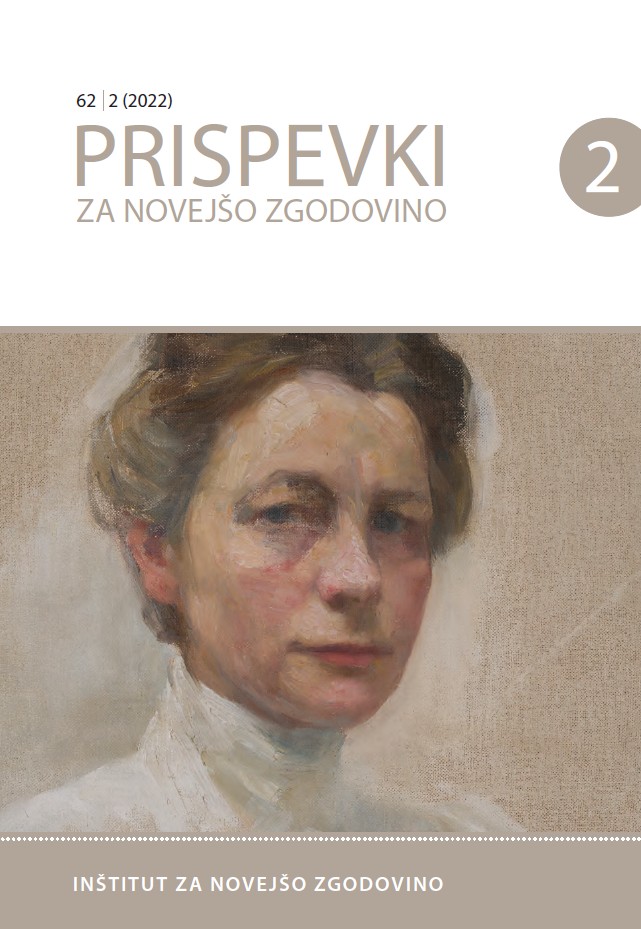“We Have Come So Far That Creditors Are More Afraid of Bankruptcy than Debtors.”
The Activities of the Ljubljana and Zagreb Creditor Protection Societies in the Interwar Period
DOI:
https://doi.org/10.51663/pnz.62.2.04Keywords:
Yugoslav Creditors Protection Society, Society of Industrialists and Wholesalers, creditors’ association, bankruptcy, compulsory settlementAbstract
The following contribution presents the activities of the Yugoslav Creditors Protection Society in Zagreb and the Society of Industrialists and Wholesalers in Ljubljana in the interwar period. The two organisations focused on protecting the interests of creditors in the Yugoslav economy and strived to recover as much as possible from the debtors for their members. The Societies would meet their objectives through the efforts of several departments specialising in the specific aspects of insolvency, from archiving documents to providing legal assistance to creditors. They also maintained connections with other similar associations in Yugoslavia and abroad. Furthermore, they were politically engaged and strived to modernise the Yugoslav economic legislation, especially regarding bankruptcies and compulsory settlements. Both Societies were still active during World War II, but they closed down soon after.
References
III. kongres trgovcev Kraljevine Jugoslavije v Ljubljani, dne 11. in 12. junija 1938. Ljubljana: s.n., s.d.
Berend, Ivan. Gospodarska zgodovina Evrope v 20. stoletju. Ljubljana: Založba ZRC, ZRC SAZU in Modrijan, 2013.
Bilandžić, Dušan. Hrvatska moderna povijest. Zagreb: Golden marketing, 1999.
Goldstein, Ivo. Hrvaška zgodovina. Ljubljana: Slovenska matica, 2008.
Goršić, Franja. Komentar stečajnog zakona, zakona o prinudnom poravnanju van stečaja, zakona o uvođenju u život oba zakona, i zakona o pobijanju pravnih dela izvan stečaja. Beograd: Izdavačko i knjižarsko preduzeće Geca Kon A. D., 1934.
Kobe-Arzenšek, Katarina. »Oris Vidmarjeve tovarne dežnikov in nogavic v Ljubljani.« Kronika 20, št. 1 (1972): 27–33.
Kolar-Dimitrijević, Mira. »O osnutku i radu Zagrebačke burze do 1945. godine.« Radovi 28 (1995): 190–211.
Kresal, France. »Gospodarska kriza 1929–1933.« V: Neven Borak in Žarko Lazarević, ur. Gospodarske krize in Slovenci, 77–95. Ljubljana: Inštitut za novejšo zgodovino in Zveza ekonomistov Slovenije, 1999.
Lazarevič, Žarko. Kmečki dolgovi na Slovenskem. Ljubljana: Znanstveno in publicistično središče, 1994.
Lazarević, Žarko. Plasti prostora in časa: iz gospodarske zgodovine Slovenije prve polovice 20. stoletja. Ljubljana: Inštitut za novejšo zgodovino, 2009.
Lazarević, Žarko. »Velika gospodarska kriza in Slovenci.« V: Metka Kastelic, ur. Pogled v zgodovino slovenskega podjetništva, 121–38. Vrhnika: Razum, 1998.
Lazarević, Žarko in Jože Prinčič. Zgodovina slovenskega bančništva. Ljubljana: Združenje bank Slovenije, 2000.
Mikuž, Metod. Oris zgodovine Slovencev v stari Jugoslaviji 1917–1941. Ljubljana: Mladinska knjiga, 1965.
Mitrović, Velizar J. Stečajno pravo s naročitim osvrtom na srpsko zakonodavstvo. Beograd: Državna štamparija Kraljevine Srba, Hrvata i Slovenaca, 1926.
Ogrizek, Emica. Stečaji in prisilne poravnave izven stečaja v gradivu Okrožnega sodišča Maribor 1898–1941. Maribor: Pokrajinski arhiv, 2008.
Počivavšek, Marija. En gros & en detail: trgovina v Sloveniji do druge svetovne vojne: trendi, strukture, prakse. Celje: Zgodovinsko društvo, 2012.
Radojičić, Spasoje. Prinudno poravnanje u stečaju. Beograd: G. Kon, 1923.
Sunčič, Mitja. Zgodovina podjetništva na Slovenskem od srede 19. stoletja do druge svetovne vojne. Doktorska disertacija. Ljubljana: samozaložba, 2011.
Downloads
Published
Issue
Section
License
Authors who publish with this journal agree to the following terms:
- Authors retain copyright and grant the journal right of first publication with the work simultaneously licensed under a Creative Commons Attribution License that allows others to share the work with an acknowledgement of the work's authorship and initial publication in this journal.
- Authors are able to enter into separate, additional contractual arrangements for the non-exclusive distribution of the journal's published version of the work (e.g., post it to an institutional repository or publish it in a book), with an acknowledgement of its initial publication in this journal.
- Authors are permitted and encouraged to post their work online (e.g., in institutional repositories or on their website) prior to and during the submission process, as it can lead to productive exchanges, as well as earlier and greater citation of published work (See The Effect of Open Access).


